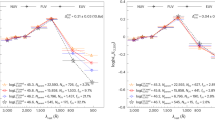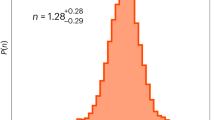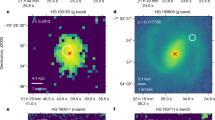Abstract
Strittmatter, Faulkner and Walmesley1 have suggested that there is an anisotropy in the distribution of quasars with large red-shift over the sky, pointing out that most of those discovered to date fall in two regions near the galactic poles. In this communication we present evidence that this anisotropy may be merely an effect of observational selection.
This is a preview of subscription content, access via your institution
Access options
Subscribe to this journal
Receive 51 print issues and online access
$199.00 per year
only $3.90 per issue
Buy this article
- Purchase on Springer Link
- Instant access to full article PDF
Prices may be subject to local taxes which are calculated during checkout
Similar content being viewed by others
References
Strittmatter, P., Faulkner, J., and Walmesley, M., Nature, 212, 1441 (1966).
Veron, P., Ann. d'Astrophys., 29, 231 (1966).
Pauliny Toth, I. I. K., Wade, C. M., and Heeschen, D. S., Astrophys. J., Suppl., 13, No. 116 (1966).
Hoyle, F., and Burbidge, G. R., Nature, 210, 1346 (1966).
Wyndham, J. D., Astrophys. J., 144, 459 (1966).
Author information
Authors and Affiliations
Rights and permissions
About this article
Cite this article
PENSTON, M., ROWAN-ROBINSON, G. Anisotropic Distribution of Quasars with Large Red-shift. Nature 213, 375–377 (1967). https://doi.org/10.1038/213375a0
Received:
Issue Date:
DOI: https://doi.org/10.1038/213375a0
This article is cited by
-
No anisotropy in angular diameter–redshift relationship
Nature (1976)
-
Angular Distribution of Quasistellar Objects
Nature Physical Science (1971)
-
Bulletin GRG, No. 25: List of publications
General Relativity and Gravitation (1971)
-
Large Scale Density Inhomogeneities in the Universe
Nature (1967)
Comments
By submitting a comment you agree to abide by our Terms and Community Guidelines. If you find something abusive or that does not comply with our terms or guidelines please flag it as inappropriate.



